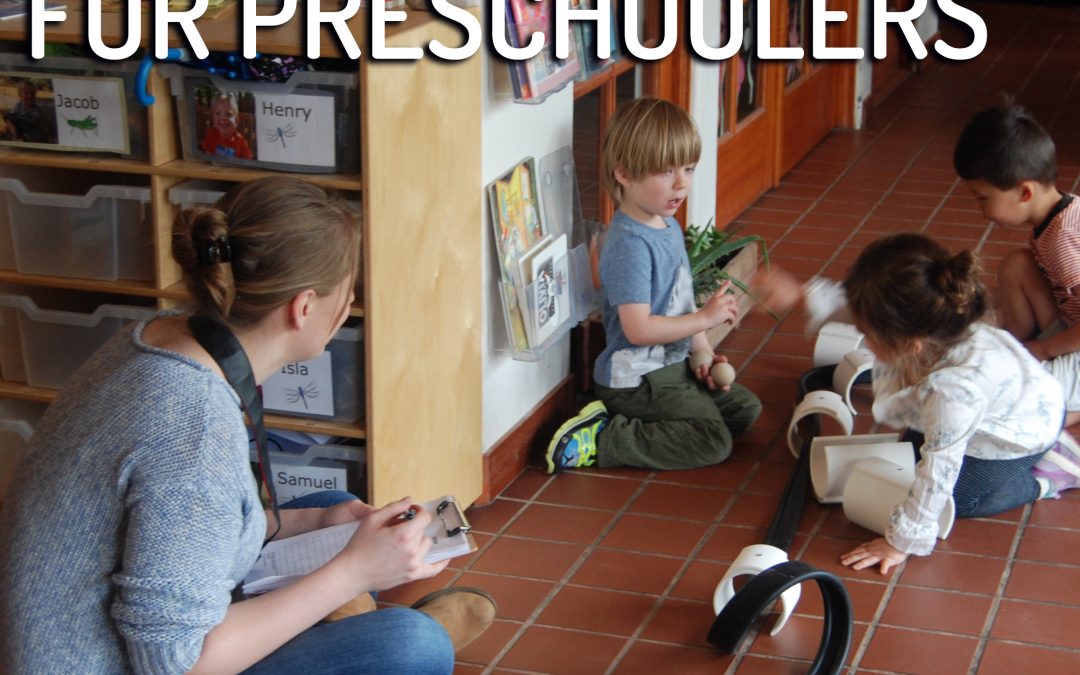STEM is here to stay, and more early childhood educators than ever are introducing integrated science, technology, engineering, and math concepts in their classrooms. Children are wired to learn these concepts and the associated language best through hands-on play and experimentation. We’ve come up with our top STEM words that we feel every preschooler should be learning, and have given examples of how to introduce these words in a developmentally appropriate way. These terms are particularly useful when working on engineering with ramps, blocks, balls and other accessories.
To introduce these words, we encourage you to use them in context during children’s play. By identifying when these STEM concepts are happening in action, you can begin to incorporate this vocabulary into a natural dialogue with your children. You’ll see that the more often you use these words in context, the less often you will need to explain what you mean. In a short time, children will use the words on their own as they begin to understand their meanings.
Click here to download a printable version of this list
Top 15 STEM Vocabulary Words for Preschoolers: Definitions and Example Sentences
- Hypothesis
- Definition: a proposed explanation made on the basis of limited evidence as a starting point for further investigation.
- Example: “What is your hypothesis for what will happen after we put the ball at the top of the ramp?”
- Theory
- Definition: a supposition or a system of ideas intended to explain something, especially one based on general principles independent of the thing to be explained
- Example: “You think the ball will go up the ramp when we let go of it? That’s an interesting theory. Why do you think that?”
- Elevation:
- Definition: the height to which something is rises
- Example: “What do you think will happen if we change the elevation? What will happen to the ball if you lift the ramp higher or lower it’s elevation?”
- Speed
- Definition: the rate at which someone or something is able to move or operate
- Example: “How do you think the ramp’s elevation will affect the ball’s speed?”
- Experiment
- Definition: a scientific procedure undertaken to make a discovery, test a hypothesis, or demonstrate a known fact.
- Example: “Now that we’ve created our hypothesis, what experiment can we create to test it?”
- Pattern
- Definition: a repeated decorative design.
- Example: “I see that in your ramp system, there is one long, then one short, one long, and another short. What size ramp is next in this pattern?”
- Balance
- Definition: a condition in which different elements are equally proportioned
- Example: “It looks like the teeter totter is off balance. Which side do you think needs more weight to in order to make both sides equal?”
- Friction
- Definition: the resistance that one surface or object encounters when moving over another.
- Example: “What do you think would happen if we moved our ramp system to the smooth, wooden floor that has less friction than the carpet?”
- Predict
- Definition: say or estimate that (a specified thing) will happen in the future or will be a consequence of something.
- Example: “If I use the heavy ball instead of the light one, what do you predict will happen differently?”
- Observation
- Definition: the action or process of observing something or someone carefully or in order to gain information
- Example: “Tommy is going to test his hypothesis. Sara, why don’t you and I make observations, so we can take notes and drawings of what happens!”
- Force
- Definition: any interaction that, when unopposed, changes motion of an object
- Example: “When you applied more force to the ball by pushing it, I noticed it went faster.”
- Data
- Definition: facts and statistics collected together for reference or analysis
- Example: “Let’s collect some data so we can compare how far the ball travels on different ramp systems.”
- Design
- Definition: purpose, planning, or intention that exists or is thought to exist behind an action, fact, or material object.
- Example: “Let’s try something new. Before making a ramp system, we’ll make a design on paper, then follow it as we build.”
- Cause
- Definition: something that gives rise to an action, phenomenon, or condition.
- Example: “The ball fell off here – what do you think was the cause for that?”
- Effect
- Definition: a change that is a result or consequence of an action or other cause.
- Example: “I noticed when you moved this ramp, a little gap formed between it and the next one. I wonder what the effect will be on the ball when we try again?”


